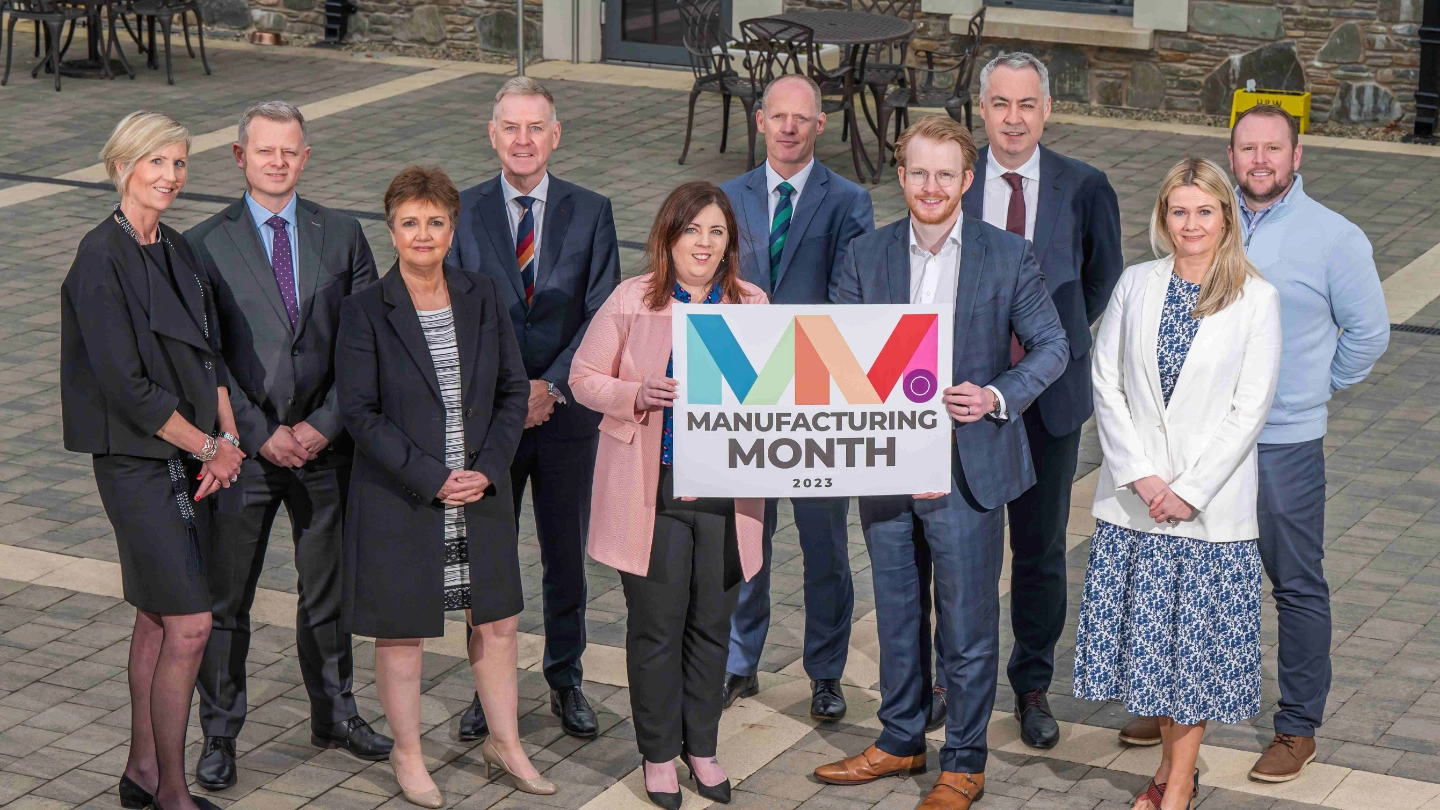Manufacturing Month is organised to showcase excellence in NI in the manufacturing industry. Andrew, one of our business experts, participated in a panel discussion focusing on the impacts of the Good Friday Agreement, on the economy, 25th years on. Manufacturing Month Panel Discussion, Andrew McBurney Manufacturing NI invited various experts during Manufacturing Month to discuss some important topics. We thought you might want to read more about some of them. Andrew McBurney, Head of Business Development in Ireland, has been with Atradius for over 25 years. In his current role, Andrew engages with many customers and brokers, giving him an understanding of a wide range of industries and a keen insight into the economic landscape of Ireland and Northern Ireland. Andrew also dedicates some of his time to sharing his expertise at numerous industry events. Recently, he participated in a panel discussion at Manufacturing Month (MM2023) in Northern Ireland.
MM2023 has been organised by Manufacturing NI as a celebration of Northern Ireland's manufacturing industry. It serves as a platform to showcase excellence within the region and sector.
Throughout the second quarter of 2023, they will be organising many seminars, tours, and events in Northern Ireland, addressing the sector's challenges and potential future opportunities as we enter a new decade.
This year, we also celebrate the 25th anniversary of the Good Friday Agreement, which marked a significant turning point for Northern Ireland. As a result, this influenced some of the MM2023 round table topics, one of which Andrew had the privilege to participate in. Take a look at some of his answers below:
In celebration of 25 years on from the Good Friday Agreement, of the untapped economic potential of Northern Ireland.
What role can manufacturing play in unlocking that potential? How can local businesses trade safely and sustainably across the world in what is a very uncertain and unstable global environment?
My journey in credit insurance began 25 years ago and at that stage, our customer profile was made up of a lot more ‘traditional’ manufacturing, for example, textile businesses. Over this time, I have seen a shift toward new technologies, IT, Pharma, Precision Engineering, Plastics etc., driven largely by a higher-skilled workforce.
We underwrite over €2bn of supplies into Northern Irish businesses and Manufacturing is very much still the backbone of the economy, with many of these companies still family-owned.
How do you think the sector will evolve over the next 25 years?
Following Brexit and the Protocol, we are beginning to see a shift towards exports as businesses alter their trading arrangements. In the latest report from the Department of the Economy, exports had increased by 16.6% and we expect this to continue. Many companies like the one we are in today (Hinch Distillery) are using credit insurance to expand their markets and find new customers using our network of 160 offices in over 50 countries.
How important is political stability to a thriving manufacturing sector and wider NI economy?
The Windsor Framework has created a unique opportunity for Northern Ireland with significant future potential. PM Rishi Sunak recently and excitedly commented, “Northern Ireland is the world's most exciting economic zone” adding we are the envy of many countries as we would have access to both the European single market and the UK. In order to achieve this opportunity, I firmly believe that we need a functioning government to bring about stability and certainty.
In an increasingly volatile trading environment, what other general risks are firms grappling with? How can they safely handle these to protect their revenues and business?
We have had the “Perfect Storm” of uncertainty
Brexit/Protocol/Windsor Framework
Covid Pandemic (Government Support Schemes now ended)
Energy Crisis
Record Levels of Inflation (>10% in March 2023)
Labour Shortages
Interest Rate Rises
Global Tensions – Russia/Ukraine, China/Taiwan, Sudan etc.
Locally in Northern Ireland, we have recently seen a return of “Creditor Led Winding Up Petitions” in the Courts (following the Pandemic) which is expected to see increased insolvency proceedings
Within Atradius, we are seeing rising claims activity in excess of pre-pandemic levels
Uncertainty has been the only certainty and the last thing any business, any manufacturer wants is to leave being paid to chance. A lot of time, sweat, blood and tears can go into creating a product, bringing it to market, finding a customer, and winning the contract only to end up not being paid. We would encourage all businesses to look at credit insurance to help them.
Should firms feel confident or cautious as we move through 2023?
Yes, they should feel confident but they should not be complacent.
Looking ahead, we can see that the manufacturing sector in Northern Ireland is ready for further development. The ramifications of Brexit and the Protocol have created an opportunity towards exports, where businesses need to adjust their trading arrangements.
The recent increase in exports, as highlighted by the Department of the Economy, instils optimism about the sector's future trajectory.
To fully maximise the opportunities presented by the Windsor Framework, political stability is essential to provide the certainty required to propel Northern Ireland's economy forward.
However, amidst an increasingly volatile trading environment, businesses face numerous challenges beyond political considerations. The convergence of the post-Brexit implications, the Covid-19 pandemic, the energy crisis, inflation, labour shortages, and global tensions create uncertainty. Under these circumstances, firms must protect their revenues and business interests. Credit insurance emerges as a vital solution, providing a competitive edge and certainty in an uncertain world.
 Ireland
Ireland
